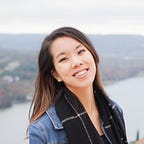02.07 // Guest Speaker: Lowell Reade, Cultural Probes Feedback
Syllabus | Class Box Folder | Cultural Probes Assignment
What is the shape of a design career? Tuesday, we had CMU MHCI alum and Duolingo User Experience Researcher Lowell Reade speak to the class. Reflecting on the past five years of his career, he addressed three major milestones —
1 — Find your strengths. Here, he defined strengths as “what makes you feel strong”, even if it’s something you are not great at initially. What type of work gives you strength and joy?
[Strengths can be] things that make you feel strong, even if it might not be something you’re good at or something that comes naturally… [they can be things] you feel energized by and want to become better at.”
Reade talked about his research experience at Apple, studying patterns of behavior in employee cafes to design better cafe menus, and at Medallia, immersing with hotel kitchen staff, even making hotel beds with housekeeping to understand customer experience. Through his work in user research, he validated that learning about people was a satisfying pursuit and strength.
2 — Measure your impact. As a researcher, impact can refer to the impact you make on your team, through compelling frameworks, diagrams, or stories.
“[Impact] for me as a design researcher, was largely helping my team think about people differently.”
There’s also the impact of design on the end user. At Facebook, Reade was part of a team incorporating maps with events, and created a framework around maps being a factor in people’s decision-making. He then tested different design concepts to see how different designs impacted people’s decisions.
3 — Navigate the unknown. Taking an open, ethnographic lens can lead to a richer picture of how your design fits into a person’s life.
At Duolingo, Reade had people around the world submit pictures of where they were using Duolingo, and saw that people were using it in the kitchen while waiting for the oven, or even sitting around other people in the living room. What opportunities for design might open up from discovering new use cases and contexts?
Student Q&A
Several conflict-resolution-type questions were brought up, exploring the difficulties of being a design researcher in the tech industry.
Ethical systems. As a researcher, do you have influence over product ethics, and the ability to re-imagine the systems that overlook the product?
Reade offered frameworks for thinking about the question more in depth. What are effective ways of striking balance in difficult situations, either in tech or in life, in general?
Win-lose decisions. Who pulls the trigger on difficult design decisions where there are known consequences whether you do it one way or another?
Reade talked about different types of organization hierarchies, where a more democratized organization may allow a designer or engineer to “stop the wheels in motion” and avoid major issues.
Justifying design. How do you help others see the value of design and design research?
Reade offered three methods — (1) focusing on shared goals and values, (2) showing success stories from past trials and (3) bringing in other stakeholders’ voices that may add to your narrative.
Cultural Probes Feedback
In students’ design probes, instructors looked for creativity, ambition, and exploratory, provocative questions over the collection of robust, quantitative data.
Students shared their sketches of probes, introducing fun ways of collecting exploratory user research. Form factors included gumball machines (to collect feedback cards), templated post cards, and printed booklets with laser cut stencils to encourage feedback.
How might different forms of fun and engagement encourage Construction Junction shoppers to share their insights on their shopping experiences? How might different designed artifacts provoke different responses? Everyone has experienced a simple survey, but what might be some ways to boldly tackle a research question in ways you have not seen or experienced?
